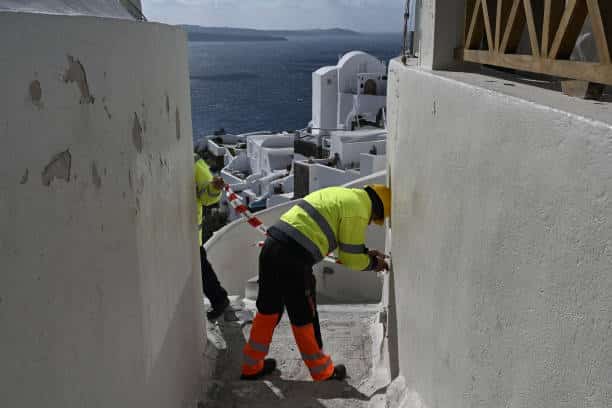
Municipal employees place caution tapes to restrict access for tourists as a precaution due to recent seismic activities in Oia village on the Greek island of Santorini on February 5, 2025. Some 7,000 people have left the island, known for its spectacular cliffside views and dormant volcano, which has been hit by hundreds of tremors since January 24, 2025, officials said. (Photo by STRINGER / AFP) (Photo by STRINGER/AFP via Getty Images)
(EPICSTORIAN) – Homes trembled, buildings cracked, and the sea roared as Santorini was shaken by violent earthquakes.
The tremors, some exceeding 4.0 on the Richter scale, sent tourists scrambling for flights and ferries. Crowds packed ports and airports, desperate to leave before another major quake struck.
Among those who stayed, a quiet determination prevailed. Fear took a back seat to duty, survival, and deep-rooted connection to the island.
“The sound of houses breaking apart is unbearable,” said Margarita Karamolegkou, a local businesswoman. “I haven’t slept properly in weeks. But fear? No. This is my home.”
Santorini has seen destruction before. A 7.8-magnitude earthquake in 1956 nearly wiped it off the map. Buildings collapsed, a powerful aftershock followed, and fifty-three people lost their lives.
Those who survived fled by sea, rowing toward safety. Decades later, the island transformed into one of Greece’s most visited destinations. Now, the ground shakes again, and uncertainty grips the community.
Defiance in the Face of Crisis
Some chose to leave, but others stayed behind, unwilling to abandon their land and people. Volunteers and business owners stepped in to support their neighbors.
“If a major quake hits, I’ll be there before the firefighters,” said Matthaios Fytros, a local merchant and volunteer. “People with disabilities, the elderly—they need us. We won’t leave them behind.”
Empty homes stood at risk of looting, but the greatest concern remained the land itself. Calls for stronger infrastructure have echoed for years, with little action taken.
“We’ve been asking for a better port, better protection for the island’s environment,” Margarita said. “We need to preserve what makes Santorini special. Tourists bring life to this island, but if we don’t protect it, we risk losing everything.”
Tourism drives Santorini’s economy, contributing 5.9 billion euros annually—about 2.5% of Greece’s GDP. With tremors persisting, businesses worry the season could collapse.
Eirini Mindrinou, who survived the 1956 earthquake, questioned the island’s rapid expansion. “We’ve damaged the environment here,” she said. “Now, nature is reminding us who’s really in charge.”
Looking Ahead
No one can say when the shaking will stop. Scientists study the seismic activity, but answers remain uncertain. For those who refuse to leave, resilience offers the only path forward.
“I try to think of what’s happening with kindness,” Margarita said. “The volcano, the earthquakes—they shaped this island into what it is today.”
Pride remained in Matthaios’ voice. “We are the most beloved island in Greece,” he said. “And we will get through this.”







